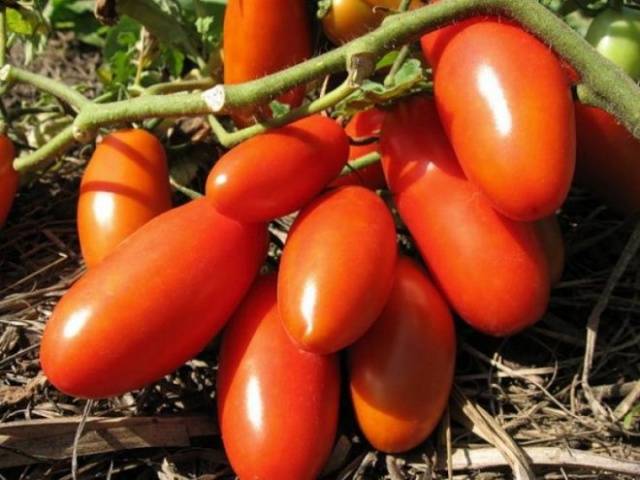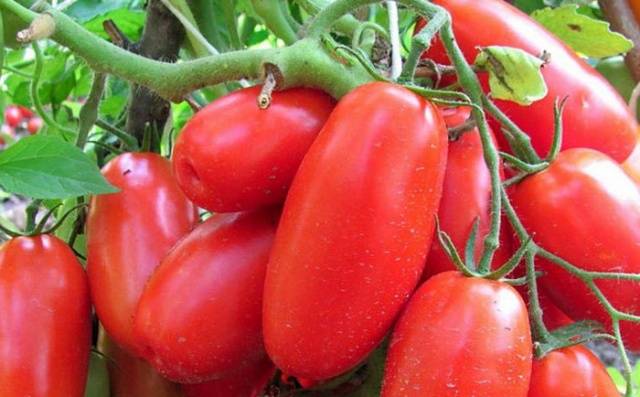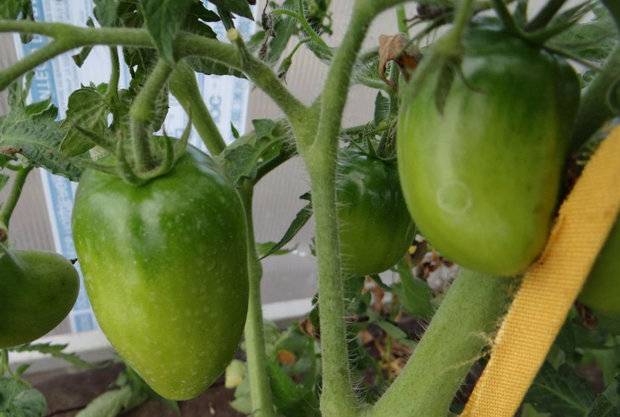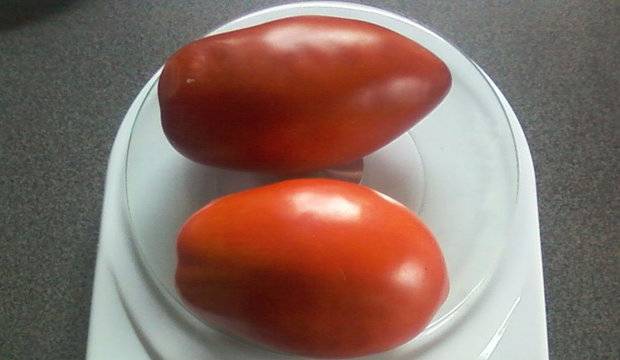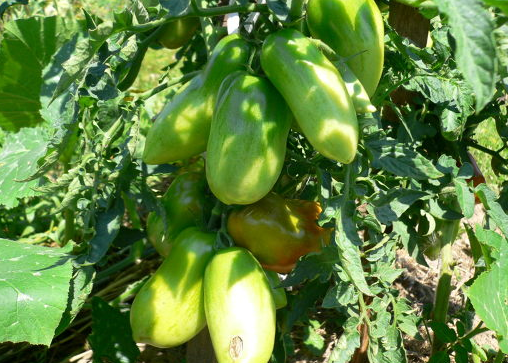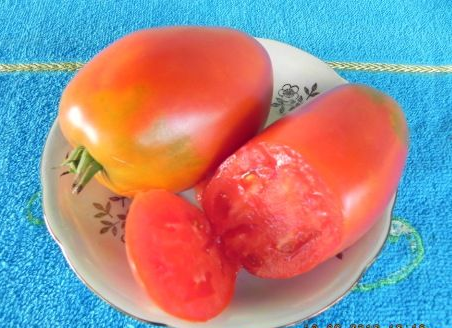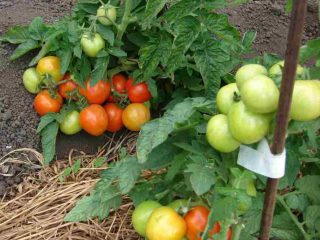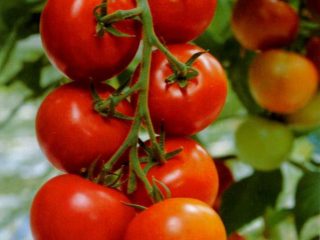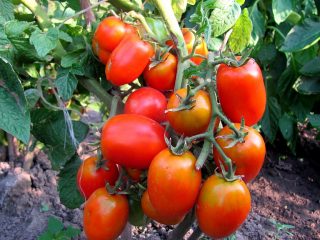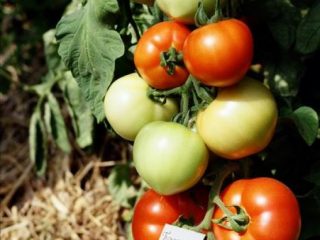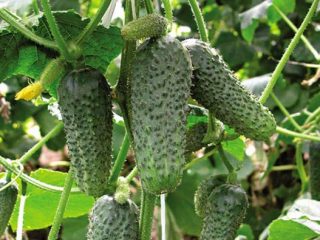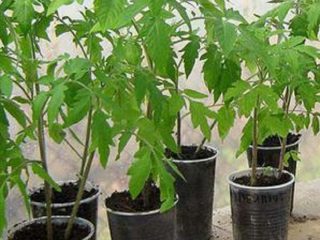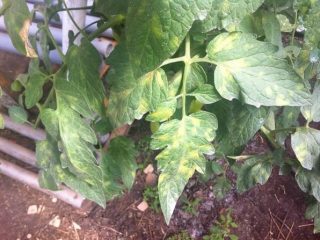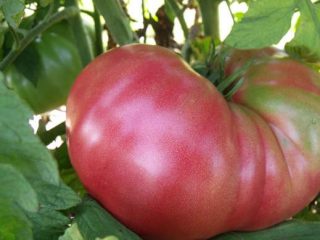Content
In 2004, Siberian breeders developed the Siberian Troika tomato variety. It quickly fell in love with gardeners and became widespread throughout the country. The main advantages of the new variety are unpretentiousness, high yield and amazing taste of the fruit. In addition to the listed qualities, “Siberian” tomatoes also have a number of other advantages that every gardener should know about. For those who are not yet familiar with the culture, in this article we will try to give the most detailed description of the “Siberian Troika” variety, photos and reviews about it.
Detailed description of the variety
Delicious Siberian Troika tomatoes will always be in demand in the housewife’s kitchen. You can use them to prepare not only salad, but also pasta, juice, and pickles. Unfortunately, it is almost impossible to find varietal vegetables on sale, so you can only get “Siberian” tomatoes by growing them yourself. To do this, you should know the features of the agricultural technology of the variety and the description of the vegetables themselves.
Description of plants
The “Sibirskaya Troika” variety is determinate, standard. This means that its bushes, up to 60 cm high, independently regulate their own growth.When caring for such tomatoes, it is only necessary to occasionally remove underdeveloped stepsons and lower large leaves.
The stem of the Siberian Troika tomato is very thick and durable. It ensures the stability of the plant. Such bushes require staking only at the fruit-filling stage. A well-developed root system of tomatoes actively nourishes the plants and becomes the key to a bountiful harvest.
As they grow, “Siberian” tomatoes form fruiting clusters consisting of 5-10 flowers. The first inflorescence is tied above the 9th leaf. Higher up the stem, flowers are formed every 2 leaves. In total, 10-12 inflorescences are formed on the main stem per season, after which the tomato bush stops growing. In favorable conditions, you can prolong the fruiting of the plant by growing one of the side shoots. So, about a month before the main shoot is completed, one of the strongest fruit-bearing shoots should be selected and left. As it grows, it, in turn, will also produce a harvest from 10-12 fruiting clusters.
Description of fruits
Siberian Troika tomatoes have an interesting, cylindrical or pepper-shaped shape with a small spout at the tip. The length of tomatoes can reach 15 cm, and the weight varies from 200 to 350 g. The light green color as the fruit ripens turns brown and then bright red. The skin of tomatoes is dense, but at the same time very tender, which is important when preparing a salad. The inner pulp of the fruit is tasty and sweet. In it you can literally see 3-4 small chambers filled with juice and a large number of seeds. Tomato seeds of the “Siberian Troika” variety can be harvested for the next season from mature vegetables yourself. They have good germination.
“Siberian” tomatoes contain a lot of vitamin C, lycopene and other useful substances. The uniqueness of the crop lies in the fact that its fruits retain their beneficial properties even after heat treatment.
Variety resistance to diseases
The Siberian Troika tomato variety has amazing immunity to many diseases and pests. But despite this, experienced farmers still recommend carrying out preventive measures to protect tomatoes several times a season. For these purposes, you can use special biological preparations or folk remedies. It is rational to use chemicals only at the stage of active spread of the disease.
Late blight, known to many, can seriously damage “Siberian” tomatoes under certain conditions. To combat it preventively, after prolonged rains and sharp temperature fluctuations, you should use folk remedies, which you can learn in detail from the video:
Productivity
The determinate variety “Sibirskaya Troika” allows you to get a good harvest of tomatoes in open and protected areas of land. The volume of vegetables collected from one bush can exceed 5 kg. In terms of 1 m2 soil this figure is approximately 15-20 kg. Genetic resistance to external factors allows us to talk about consistently high yields.
Ripening of Siberian Troika tomatoes occurs 110-115 days from the day of seed germination. It is recommended to grow tomatoes in seedlings. The presence of picking and transplanting can increase the ripening period of vegetables by several weeks.
Advantages and disadvantages of the variety
Surprisingly, the “Siberian” variety has no significant disadvantages.This is confirmed by numerous reviews and comments from experienced farmers. You can get a harvest of these vegetables with minimal care, in any conditions. The obvious advantages of the variety are:
- high level of productivity compared to other determinate varieties of tomatoes;
- especially large fruits with amazing taste;
- possibility of long-term storage of mature vegetables;
- no need to regularly form bushes;
- compactness of plants;
- high resistance to diseases and pests;
- the ability to grow the variety in open ground.
Of course, all of the listed advantages can become a compelling argument when choosing a variety, but it is worth remembering that in order to obtain high yields in a greenhouse, indeterminate, tall varieties should be grown. For open ground, determinate tomatoes are the best option.
Growing tomatoes
The “Sibirskaya Troika” variety is zoned for Siberia and the Urals, but it is also successfully grown in the southern part of the country. In warm regions, tomatoes can be cultivated by sowing the seed in the ground. In harsher climates, it is recommended to grow tomatoes as seedlings.
It is recommended to sow tomato seeds of the “Sibirskaya Troika” variety for seedlings 2 months before the expected date of planting the plants in the ground. Thus, in Siberia, it is recommended to plant seedlings in open ground in the first ten days of June. Seedlings can be planted in the greenhouse at the end of May.
Before sowing, tomato seeds must be soaked alternately in a solution of potassium permanganate and in a solution of a growth stimulator. After treatment, the seeds can be sown in nutrient soil to a depth of 1 cm.If it is decided to sow seeds for seedlings in one large container, then the distances between seedlings should be at least 1.5 cm.
When the tomatoes have 2 full-fledged, strong leaves, the seedlings should be planted in separate containers. Before this, it is recommended to feed the young seedlings with potassium and phosphorus fertilizers.
During the growing process, seedlings need to be fed 2-3 times with mineral and organic fertilizers. By the time of planting at a permanent growing site, tomato seedlings should have 10 large leaves of bright green color. The height of the seedling should be 20-25 cm.
Tomato seedlings should be planted in rows:
- distance between rows 50 cm;
- the distance between seedlings in one row is 40 cm.
After planting, the plants need to be watered and left alone for 10 days. Further care for tomatoes consists of regular watering and loosening the soil. Fertilizers should be applied every 1.5 weeks. During the growth of greenery and the formation of fruits, it is necessary to use nitrogen fertilizers; during the ripening of vegetables, potassium-phosphorus preparations should be used to improve the taste of tomatoes.
Conclusion
Siberian Troika tomatoes are an excellent option for open ground. They do not require special care and produce a harvest of excellent taste. Dense and meaty tomatoes are good for salads, sandwiches, juices and canning. They ripen together and contain a number of useful microelements. “Siberian” tomatoes can be a real godsend for experienced and novice gardeners.
